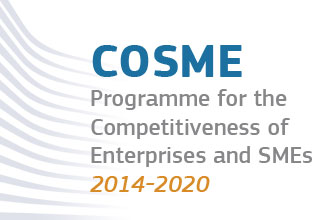 newsitems
newsitems
newsitems
1st Protestant feast in Strasbourg: Bible,Freedom,Merkel,Music+Ecumenism: EU Christian roots Future?
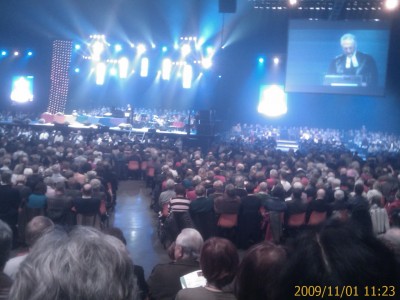
Can Christians be re-united today and/or overcome a threat to become a Minority in Europe itself, safeguarding and developing further Europe's largely christian historic roots, in mutual respect and useful dialogue with other Religions and "free" believers, particularly in front of crucial Moral, Social, Technologic and Political Challenges faced by EU Citizens and all Humankind today ?
These questions, explicitly or de facto, were at the heart of this week's gatherings in Strasbourg between Religious people and simple Citizens, at the eve of an exceptional CoE's Conference on the only legally binding instrument in the World on BioEthics : The "Oviedo" International Convention on Medicine, Biology and Human Rights, which faces perhaps the most crucial challenges raised by galoping technologic developments.
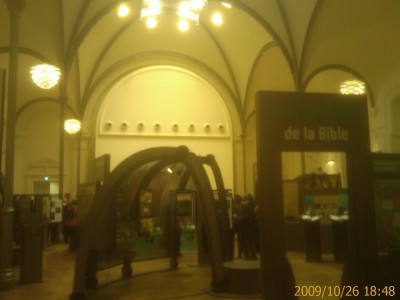
During all these days, the Holy Bible was omnipresent in Gutenberg's city :From an Ecumenic Exhibition, to the 1st open Protestant popular Convention, including also Bible lectures, University library's historic items on Calvin's stay and work in Strasbourg, and an open air Mass where the gospel was read by a blind Woman using Braille, up to tragic Human Rights violations fex. by evoking the search of those responsible for the atrocious killing after torture of 3 workers at a Bible editor on 2007 in Turkey, denounced earlier by EU Parliament, etc.
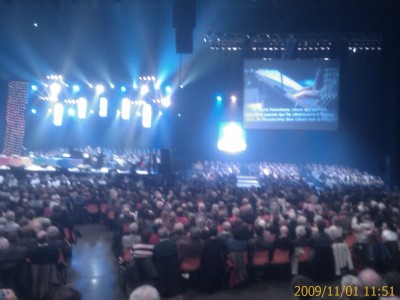
Spreading allover from Politics and Human Rights issues, to Gospel Music and even fresh election winner German Chancellor Merkel (a Christian Protestant lady raised at Eastern area of Germany), Artistic, Religious and other events attracted more People than expected to an open air Protestant Mass, after Music concerts in "Zenith-Europe" (about 9.000 people) and elsewhere, during more than 3 busy Days plenty of parallel events (Conferences, Debates, Stands, Theater plays, Concerts, Exhibitions, Poetry, etc), for the 1st Protestant Convention "open" to Politicians, Experts and all interested People, at public areas in the heart of the city.
- "Welcoming our Protestant Friends", Strasbourg's Catholic Bishop Mgr Gralet opened, earlier this week an Ecumenic Exhibition on the Bible, with the participation also of an Orthodox polyphonic choir from Greece and other Christian Communities, as well as Jewish and Muslim religious representatives, because "the Bible is the heritage of all Humanity", as he stressed.
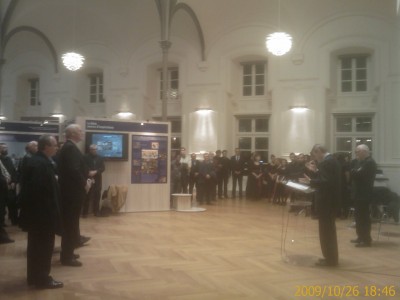
A first reply was the relative success of the event, which has gathered some 10 or 11.000 or more people, according to organisators' estimates, filling up twice Strasbourg's biggest space : the Zenith, with more participants coming for the Sunday Mass than for the Saturday Music Concerts, obliging to extend the event by TV cable also at the PMC Conference area. This made them announce their intention to repeat such experiences from now on "each 4 Years", the next being in 2013, "unless unexpected positive developments invite us to do it earlier", as they carefully said, while also pointing at the need to fill a larger gap than expected in the needed funding..
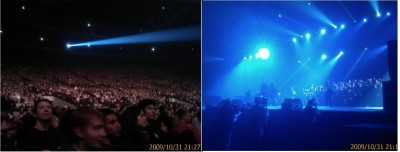
Meanwhile, the Catholic Christians, (a Majority in France and other EU countries), adding to an apparently renewed enthousiasm and/or will to act, had already anounced a 2011 Mega-Event in Strasbourg for the European Youth gathering, as Mgr Christian Kratz confirmed to "EuroFora".
But numbers and rumours look hard : F.ex. French Protestants revendicate only about 2 or 3% throughout France and some 17% in Alsace region around Strasbourg, close to Switzerland and Germany. While rumours about all Christians taken together (i.e. Catholics, Protestants, Orthodox, Armenian and others) threatened to become a "Minority" in Europe were, rightfully or wrongfully reminiscent this week, added to persecutions of Christians evoked even in neighbouring countries.
Thus, after all this week's events commenced by the prelude of an Ecumenic Exhibition on the Bible, efforts to rapproach or even re-unite most or all Christians together were discussed during a Debate on the "European Ecumenic Charter", signed by representatives of all Christians on 2001 in Strasbourg,
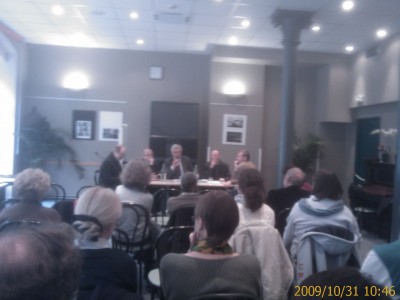
Protestant Jean-Arnold de Clermont, experienced former President of the European Churches Conference, strongly pleaded in favor of leaving institutional issues aside, at least for a while, in order to focus on issues of substance.
Catholic deputy Bishop, Mgr Christian Kratz, replied to "EuroFora" that, despite practical difficulties, "we have recently started to cooperate, all Christians together, mainly on Society issues".
The President of the Federation of Protestans in France, Claude Baty, speaking to "EuroFora", said that "Strasbourg was chosen for this exceptional event also for its role as a European and Religious cross-roads".
Socialist MEP Catherine Trautmann, a former Protestant University professor, speaking to "EuroFora", agreed that, Christian and Religious Peuple should be united today to act together mainly on "Social issues".
But, Florian Rochat, an Evangelist, head of a Strasbourg-based "European Committee to protect Human Dignity", revealed that on certain issues, such as f.ex. BioEthics, many Evangelists feel closer to Catholics, and work closer together than with the rest of Protestants" (Reformed and Lutherians).
A "Diversity that is not Division", observed, speaking in general on such issues, several Christian Protestant leaders, adding that it was already an achievement to succeed to bring together all Protestants to celebrate one Mass for all...
Adding to the diversity, Muslim representative Veysel Filiz, said to "EuroFora" that Muslim Communities generally are not so much interested on issues as BioEthics and "prefer to leave it for the State" to settle them, except, perhaps of some controversial questions on "blood donations", "abortion" etc. But they don't react on any Genetic manipulation of Human Embryos, etc. he added. (A point on which, however, another, Arab-origin Muslim representative at the CoE had earlier told as a diifferend story, according to which there were contrasting trends between various components of the Muslim world on BioEthics, and "those who are closer to the People" do care about these issues too, as he had said).
-------------------------------------
"Minority" you said ? Better read anew Diderot's "Jack the Fatalist"...
---------------------------------------
Contrary to those who diffuse a rather artificial pessimism, claiming that christians would have become a "Minority" in Europe in a kind of "Fatalistic" way, Sociologist Jean-Paul Willaime, seemed both realist and optimist : All Christian and other Religions appeared, some years ago, threatened to become an issue of Minorities, but recently, another trend seems to emerge, inciting People to re-discover religion and Christianism. And this has a Future, he noted.
What may attract and motivate People, old and young, to find anew an interest in Christian Religion ?
Politics are a contradiction, or an opportunity ?
During a discussion between Christian Protestant Politicians, from the Right and the Left, Philippe Richert, vice-president of the French Senate, from the Governing Cebnter-Right majoriy, said that, instead of a challenge, he found a precious "Chance" in the fact that he was Christian in order to "get involved in Politics". F. ex. "soon we'll have to decide on many important BioEthical issues during the revision of the 2004 Law", he observed.
An issue that the Senate of France has "already prepared a Committee" to deal with "in 2010", as its President, Gerard Larcher, told "EuroFora".
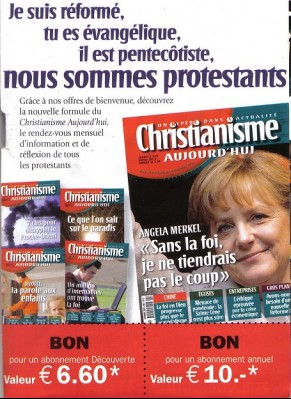
At any case, German Chancellor Angie Merkel, winner of 3 Elections in a row, (after September 2005, also on June and September 2009 EU and National votes), served as one of the ways to try to attract peope : Proof is a 1st Page addition to the French Protestant Magazine "Christianism Today", which made an interesting offer to subsrcibe for a year, placed under a smiling Photo of Merkel saying in the Headlines : - "Without Faith, I wouldn't have done it !"..
Moreover, it's shortly after German Chancellor Merkel just congratulated on 29 October "the 1st Woman elected at the head of Germany's Evangelic Christian Church" (Protestant), Bishop Margot Kaessmann, that a Journalist raised critical Questions in Strasbourg on "why wasn't there any Woman yet among France's Protestant Church leadership ?" Embarassed smiles and vague promisses welcomed the move among 4 protestant leaders, all men ..

More serious, pastor Geoffroy Goetz, President of Alsace-Lorraine's Synodic Council, speaking to "EuroFora" on German Chancellor Merkel, admitted that "the fact that she is woman who comes from the Eastern area of Germany, at this moment that we are celebrating Germany's and Europe's re-unification, might give a larger visibility to protestant christians".
--------------------------
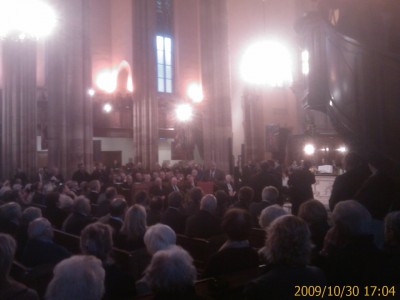 .
.Meanwhile, the President of the Senate in France, Gerard Larcher, had strongly pleaded for the principle of "Laicity", which generally obliges the State to remain out of Religious issues and to respect Religious Freedom, as well as neutrality, treating "all Citizens equally", whatever their religion might be.
But, from one side, a representative of a Turkish group, among the much larger and pluralist Muslim community, speaking in front of "EuroFora", asked for more "Mosquees, with Minarets, Ottoman-style, as in Istanbul", to be built in European Cities "with EU Money", (citting as example Duisbourg, a delcate City where riots burst out a day later between gangs for the control of prostitution and drug traffic, according to the German Press)..
However, from the other side, French Christian Protestants.. protested to Journalists in Strasbourg that "some extreme laicists" recently blocked even Local/Regional funds due to support a European Christian event organized at nearby Lyon !
At the same moment, Historic Christian Churches are barred from religious activities and changed to ..Tourist attractions, -as f.ex. Sainte-Sophie at former Constantinople (330-1920), currently Istanbul (1922-2009)- to warehouses, etc. or notoriously degraded, while their faithful people are often hindered to access, use or even restore them; (as fex. in the Occupied Territories of Cyprus), etc.
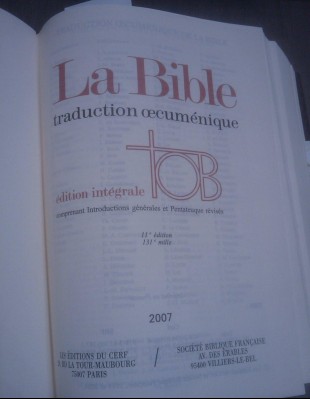
On core Human Rights issues, (without naming Tukey at all), "EuroFora" asked in a Press Conference of the Protestant leaders, if it was known whether justice was done until now (2009), in the famous case of the atrocious Murders of 3 Christian Protestants working for a Bible Editor abroad, who were viciously tortured before being killed in 2007, as it was was strongly denounced in an EU Parliament's Resolution adopted earlier in Strasbourg
- "It was in Turkey", observed the President of France's Protestants, pastor Claude Baty, in reply to "EuroFora". "It's a very complicated affair. The difficulties are the following : How could we speak about it without adding oil to the fire ? The Federation of Protestants, in such kind of situations, (and we could speak also for Algeria, or elsewhere), doesn't make declarations without being authorized by those who are directly concerned And, in this case, those who were murdered in Turkey, belonged to a Protestant Association, which didn't wish for us to make very much noise about it. Let's not cite its name. Because, they told us that if we speak about that, then, it's all of our partners and communities there (i.e. in Turkey) who risk even their lives... It's really frustrating !', he denounced.
- "But I think that, here, the Politicians take over on what will follow", President Baty optimistically added. F.ex. "Recently, the (French) Senate's President, Gerard Larcher, visited Turkey. Before he goes, he asked me to tell him what was the situation of Protestants out there, and I gave him some documentation, and I have no doubt that, during his talks, he was able to raise these issues".
- "As you see, on matters concerning the persecution of Christians in some countries, it's difficult to make declarations and take very strong action, because there is a risk, at the end of the day, to worsen, instead of ameliorating things". That's why, at least as far as the Christian Protestants are concerned as such, he felt sometimes obliged to adopt "more diplomatic" ways to defend the victims.
It remains to be seen what will be the stance of MEPs when EU Parliament will soon review in Strasbourg the results of Ankara Government's duty to fight efficiently against Impunity of torturers, murderers and their instigators, since its latest Resolution on Turkey, where these 3 Murders of Bible workers are denounced in a crystal-clear manner.
Strasbourg's ECHR case-law on Refugees topped Brussels EU Summit after Czech claims on Lisbon Treaty
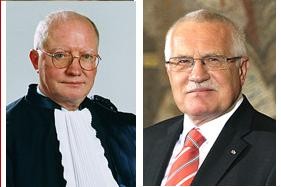
Strasbourg's ECHR's case-law on Refugees and displaced persons unexpectedly topped the European Agenda, from the current Cyprus' talks up to ..Brussels' EU Summit, as decisions on EU's top jobs were suspended on finding a solution to Czech President Klaus' claim for exceptions to the European Human Rights' principles on victims' right to return, restitution or compensation of usurpated homes and private properties, afraid that they might be applied to German-culture populations expulsed at the aftermath of the 2nd World War..
A surprise visit of ECHR's President, Jean-Paul Costa, to the Czech Republic, a few days ago, coincided with Klaus' anouncement welcoming a Swedish EU Presidency's proposal and accepting to "start working" on it, the same day that Costa, after meeting him in Prague, was visiting also the Czech Constitutional Court, (where a complaint against Lisbon Treaty is pending), at Brno on October 23, 2009.
Adding to a surprising series of converging "coincidences", the move was made the same day that, after denouncing earlier strong disagreements with Turkey on Refugees' Human Rights, now Cyprus' Media reported an agreement between Cyprus' President Christofias and Turkish Cypriot leader Talat for a "Formula" on Refugees' homes and properties with "exceptions" and special "categories" for plots of land where, meanwhile, the Turkish Occupation regime may have built "roads, public utility buildings,.. or houses and collective buildings". Something which was exceptionally hailed by T/C leader Talat as "a very good development, because with that method we overcame the deadlock on (Refugees') properties".
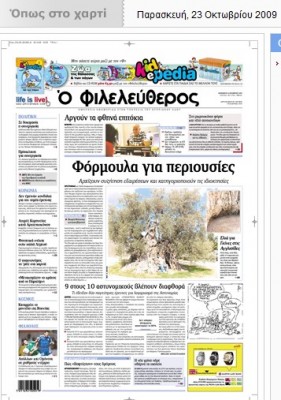
But, meanwhile, ECHR reminded both to Klaus and Turkey the "Loizidou" and "Cyprus v. Turkey" case-law against "Continuing"" violations of Greek Cypriot Refugees' Family life and Property Rights by condemning Ankara at another landmark case (Olymbiou) this week.
And Christofias reportedly said that he'd ask at EU Summit assurances that any concession to Klaus for 2ndWW issues should not affect the differend situation which still exists in Cyprus since the 1974 Turkish Military invasion, nor ECHR's case-law on Greek Cypriot Refugees, elaborated between 1996 and 2001.
- "I don't know why this visit (to Klaus and to the Czech Constitutional Court) was made now, nor what was said by President Costa", simply declined to answer ECHR's experienced Head of Communication, Rodrick Liddell, to "EuroFora"'s questions, without, however, denying that it might have been related with on-going attempts to convince Czechs to ratify the Lisbon Treaty speaking
Liddell was asked by "EuroFora" why Klaus claimed that he was afraid of Lisbon Treaty's "Human Rights' Charter", if a similar result on displaced persons' properties might be eventually obtained also through the exisiting ECHR's mecanism, that the Czech Republic has already ratified
- It's true that "ECHR already has competence to consider complaints lodged against the Czech Republic", However, "in principle it couldn't go as far as to cover 2nd World War cases" (dating from 1945), But "I don't know" "if it might be considered a continuous" violation of Displaced persons' rights, as in Cyprus' cases (dating from 1974), the ECHR Official carefully replied..
- "As you know yourself, the events which are at the origin of a case must occur after the ratification of the ECHR. That's the principle. But, there are, as you know, situations where the link between the events and the complaint is considered to be sufficient", he reminded.
Smiling at "EuroFora""s question on the astonishing "coincidence" that Klaus "positive" statement for a possible deal with the EU on his claim on German Displaced persons came "the same day" that ECHR's President Costa visited him, the ECHR's Senior Official, simply replied that he had "no information on whether the President's visit might have contributed to influence that", and promissed "to ask him about that", without denying.
Meanwhile, Karel Jungwiert, the judge elected at the ECHR in respect of the Czech Republic, who had accompagnied President Costa in his visit to Prague and Brno, was still out of Strasbourg exceptionally "until next week", apparently following constantly and consulted on the on-going dealings on Displaced persons' Rights between the Swedish EU Presidency and Czech President Klaus in the run up to Brussels' EU Summit this week-end, as well as to the preparation of Czech Constitutional Court's verdict, due to be published at Brno early next week, "EuroFora" learned from other ECHR Officials.
ECHR's President Costa was "aware" of the recent moves by Czech President Klaus' and a group of Senators to oppose Lisbon Treaty by refusing ratification as long as the 2nd WW's issue of German culture displaced People's properties wasn't definitively settled, and by lodging a collective complaint to the Czech Constitutional Court, respectively, and all that "had initially incited him to consider postponing his visit", another ECHR Official said to "EuroFora".
But she wasn't in a position to explain what made Costa, finally, change stance and decide to visit the Czech Republic, its President Klaus, and its Constitutional Court, at Prague and Brno the 22 and 23 of October, nor what was really said the day Lisbon Treaty's ratification was apparently unblocked...
All these converging but unusual Facts inevitably provoked on-going Speculations in Strasbourg on how ECHR's President Costa might have helped to convince Czech President Klaus to start moving on Lisbon Treaty, despite his proclaimed fear that 2nd WW German culture people might ask ECHR to extend "Loizidou" and "Cyprus v. Turkey" case-law, initially concerning "continuing" violations of Greek Cypriot Refugees' Homes and properties
Logically, this could be done either by ... giving up to Klaus' demand, i.e. by restricting (in one way or another) the practical functioning and the impact of ECHR's case-law, by imposing, fex. more strict temporary and/or restitution limits, etc., or, on the contrary, by reminding him that ECHR already existed, independently of Lisbon Treaty. and Human Rights could not be modified for political expediences.
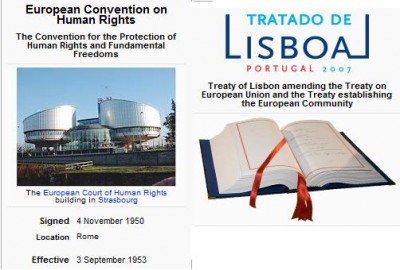
But the first option woud be obviously percieved as a serious setback on Human Rights' protection for Political expediencies , which could also provoke a dangerous precedent for other claims, by other States too in future..
On the contrary, mainstream French Newspaper "Figaro" strongly criticized, in this regard, the Czech measures of 1945, known as "Benes' regulations", "forgotten in comparison to the Shoa" by the NAZI, about "the eviction of Sudetes : .A measure of "Ethnic Cleansing", which "confiscated the properties and expulsed more than 2,5 million Germans, Men, Women and Children", in revenge of Hitler's acts in the name of a controversial "collective responsibility".
- But, "nobody didn't ever recognize the Benes' regulations, since 1945, neither in the West, nor in the European Union", the mainstream French Newspaper stressed, criticizing Klaus for "asking now the EU to indirectly legitimize the "infernal" Benes' regulations about past "Ethnic Cleansings"..
However, Klaus' move seems "absurd" since Lisbon Treaty's "Fundamental Rights' Charter" "cannot be applied, at any case, on what happened back in 1945", "Figaro" said.
Thus, another possibility is that, perhaps, on the contrary, Costa contributed to convince Klaus by simply reminding him that ECHR already existed and might eventually consider applications also by German-culture people expulsed from the Czech Republic after the 2nd WW (if certain conditions were fullfilled) asking to get back their properties, independently of the Lisbon Treaty and its "Fundamental Rights"' Charter.
This would obviously be more in line with Human Rights' general principles, regardless of whether ECHR might accept or reject such applications as inadmissible, or unfounded.
ECHR's Judgement condemning Turkey on Greek Cypriot Refugee Olymbiou's case for violating her Family life and Property Rights (Articles 8, and 1 Protocol 1 ECHR), by confirming the "Loizidou" and "Cyprus v. Turkey" case-law, denouncing a "Continuous Denial of Access", and a "Continuing and Total Denial of Access to their Property (as) a clear interference with the Right of the Displaced Greek Cypriots to the peaceful enjoyment of (their) posessions" (respectively), topically reminded both to Ankara and Klaus the European Human Rights' principles.
- "But no case ever declared admissible by the European Court on the evictions of that period" of 2nd World War from the Czech Republic, "Figaro" also noted.
Is this, perhaps, Klaus' real demand also for the present and the future ? In that case, could such a demand be acceptable by Europe, without endangering the entire European mecanism for the protection of Human Rights ?
For Cyprus, the only "advantage" from Klaus' manoeuvers could be that Nicosia might take on its side, at least symbolically, Berlin, (and in extension, Germany's closest partner : France), vis a vis Turkey's partitionist claims against Refugees' human rights.
But it's also true, that Lisbon Treaty provides for EU's accession to the ECHR, expected to submit, for the 1st time, all acts of EU institutions themselves to the control of Strasbourg's Court on complaints for Human Rights violations.
However, many had said earlier that, regardless of what anyone might think of him, Klaus' critical view on the EU might be useful at least in order to help EU Citizens fight against Bureaucracy. This leaves it an even deeper Mystery to know what or who convinced him to change orientation and focus, on the contrary, on restricting Citizens' Human Rights...
***
ECHR: Persisting Impunity for shooting to kill at Cyprus buffer zone 20 years after Berlin Wall fall
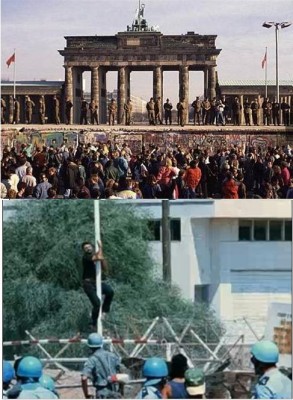
Impunity for shooting to kill at Cyprus' Bufer Zone persists until now (2009), even for killing an unarmed youngster aged 19 who saluted Turkish soldiers as "Brothers", or gravely wounding a 60 years old Woman, etc, ECHR denounced condemning Ankara twice in Strasbourg, the same week that new German Government anounced an EU-Russia-USA Summit for Berlin Wall's fall 20th Anniversary, and adopted a 2009-2014 program stressing Turkey's obligation to "strictly fullfil all EU Criteria" if it wants to continue lucrative EU Negotiations.
The move came while the old formula that EU - Turkey "Negotiations will continue", whatever might happen during the next Years, as in the previous coalition with SPD's "Socialists" (for 2005-2009), was now (for the 2009-2014 new period), skipped, on the contrary, by the new German Government coalition of ChristianDemocrats and Liberals..
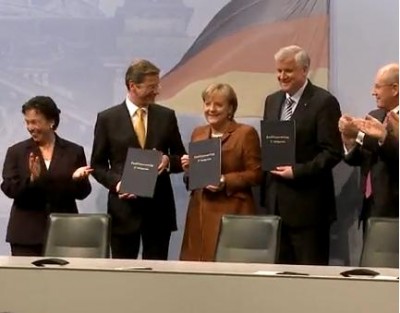
All 3 tragic Cyprus' cases judged by ECHR this week obviously point at Berlin Wall's fall, in one way or another :
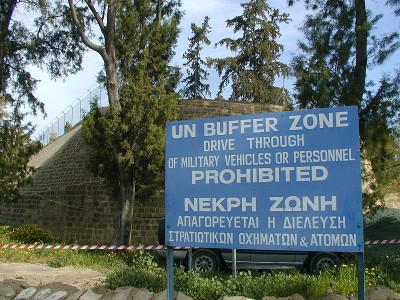
In the 1st case, an "unarmed" Youngster (aged only 19), "Stelios", was walking "alone" , in broad Daylight, waving his hat to his Turkish Cypriot compatriots and "shouting : -"Come Brother !", ECHR notes.
But he was shot and killed "by Turkish or Turkish Cypriot Soldiers", without any previous warning, as ECHR found, based on UNO's data which report that only "a single shot was heard".
- "At that moment", the "isolated man" "was outnumbered by the (Turkish) Security forces", who were "in complete control of the area, and it would have been possible for them to stop Mr Panayi without jeopardising his life", EuroJudges found.
Moreover, ECHR "regrets that the Turkish or Turkish-Cypriot forces hampered the Humanitarian intervention of UNFICYP soldiers", "preventing immediate Medical care from being administered to the victim of the shooting". "Thus acting in a manner which is incompatible with the obligation to protect Life", even while "a seriously injured man lying on the ground in Mr Panayi's circumstances would hardly have been capable of posing any threat whatsoever to armed ..soldiers".
- "UN Secretary-General reported that UNFICYP soldiers had been prevented from reaching Stelios Kalli Panayi “by Turkish-Cypriot soldiers who fired shots in the direction of the UNFICYP soldiers each time the latter tried to move forward”. This was described by the UNO as “Hostile action, including live Fire against UNFICYP", EuroJudges noted.
Thus, ECHR concluded "that Stelios Kalli Panayi was killed by agents of the respondent State (of Turkey), and that the use of force was not justified by any ..exception"
But the total Impunity of those responsible for the illegal Killing persists until now (2009), also denounced ECHR :
- "As regards Criminal-law remedies, the Court observes that the (Turkish) Government have not provided any information concerning an Investigation into the circumstances of the shooting". "Moreover, even assuming that an independent body had started an Investigation, ...it would have been pending since ..1996 without achieving any substantial results" until 2009 : i.e. for more than 13 Years !...
- Thus, the European "Court finds that the (Turkish) authorities failed to carry out an effective Criminal Investigation into the circumstances surrounding the death of Stelios Kalli Panayi. ...Accordingly ...there has been a violation of (the Human Right to Life) in this respect also"
The victim's Family, his Father and Mother, who "had been Refugees since the 1974 Turkish military intervention", and "had raised their son at a considerable cost until the age of 19", risked also to be abandoned now alone in their old age, after their unique son's killing. Contrary to their legitimate "expectation" that "as in other Mediterranean Member States of the European Union, children were supposed to take responsibility for their parents' care and social welfare in old age", EuroJudges noted.
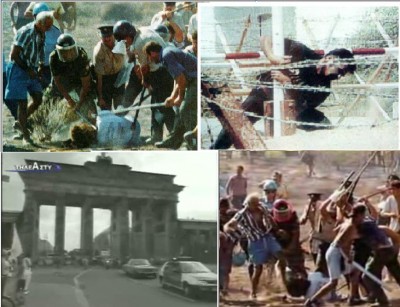
But it is astonishing that ECHR's previous leadership left another case, of even more atrocious brutality, concerning a Woman shot and gravely wounded by Turkish Soldiers close to the Buffer Zone, without taking any action in Strasbourg for .. 12 Years : 1996 - 2008, until the victim ...died meanwhile in 2005, vainly waiting during 9 Years from the European Court any elementary Justice !
It's only ...12 Years after the victim lodged its application to Strasbourg, while still suffering from grave Health consequences from wounds provoked by Turkish soldiers' gunshots, that ECHR decided to simply .. transmit her case file to the respondent Turkish Authorities, in 2008" ! If any other, national court, had delayed so much, it would have been certainly condemned by .. ECHR for excessive delay into providing justice, (Article 6 ECHR).
Georgia Andreou, a 59 years old Poor Woman, refugee obiged to work as "Hotel Cleaner" for just "414 Cyprus £ as Monthly Salary", was "hit in the abdomen by a Bullet" fired by "Turkish or Turkish Cypriot soldiers", and "collapsed", "was taken to (a) Hospital" and "operated on, but lost one of her Kidneys", became "Unable to work" after "3 Surgical Operations", and was still suffering, many years afterwards, from "Pleuritis", "post-Traumatic Stress and Depression", ECHR noted.
Her story starts when, in 1996 "over one hundred Cypriot and other European motorcyclists set off from Berlin, and made their way through EU to Cyprus" for "a demonstration aimed at protesting against the Turkish occupation". "One of the Greek-Cypriot demonstrators, Anastasios Isaak, was beaten to death" by more than 10 Turkish extremists imported from mainland Turkey at the Buffer Zone, who persisted to hit their victim with sticks and to throw stones to his head, even when he fell down, lying at the feet of his aggressors, until he was atrociously killed by a mob, as well known Films revealed. ECHR condemned Turkey on 2008 for "the killing of ..Isaak, and (for) the failure to conduct any effective investigation" in order to find and punish those responsible for the killing, EuroJudges remind now.
Isaak "was a Friend of her Son", and Georgia "attended (his) Funeral", after which, another unarmed Greek Cypriot demonstrator,; "Solomos Solomou, crossed the ...Ceasefire Line and started to climb a flagpole. He was shot and later died from his injuries". ECHR condemned Turkey in 2008 for "the killing of ..Solomou, and (for) the failure to conduct an efficient Investigation".
After "Solomou was ..shot by a Turkish or Turkish-Cypriot soldier (he) fell to the ground with blood flowing profusely from his neck (the autopsy later revealed that Solomou was hit by 5 Bullets),

Then, "Turkish or Turkish-Cypriot soldiers ..proceeded to fire some 25 to 50 rounds indiscriminately into the Crowd" .."UNFICYP ...Commanders ...observed uniformed Turkish or Turkish-Cypriot military personnel kneeling down and firing in the direction of the (unarmed) Demonstrators. As a result of the indiscriminate shooting by Turkish or Turkish-Cypriot soldiers, 2 British UNFICYP soldiers were shot from behind, and 2 Greek-Cypriot Civilians were also hit by Gunfire". Georgia Andreou, "one of the civilians, who sustained a serious gunshot wound to the abdomen, was standing outside the UN buffer zone close to the ..checkpoint", UNO's Report denounces, as ECHR observed.
UNO "strongly protest(ed) the totally unwarranted use of force by Turkish or Turkish-Cypriot military personnel which resulted in the killing of Solomou and in injuries to 2 Peacekeepers and 2 Civilians", EuroJudges note.
"The Court attaches ..weight to the fact that, according to the eyewitnesses, the opening of fire was totally Unwarranted and Not even preceded by a Warning shot". And Georgia even "had not crossed the ceasefire line, (but) had been hit by the bullet while standing outside the UN buffer zone", ECHR's judgement denounces.
The gravely wounded Woman, died later by "Brain Strokes" provoked by "high blood Pressure", following "post-traumatic Stress and Depression", after she experienced these tragic events. While vainly waiting 9 years for Justice to be done by the European Court, (1996-2005), among several related sufferings, even "a ..Metallic element was detected on the right side of her Liver, possibly due to the Bullet from the Gun". The Doctor who examined her all these years observed that "she seemed frightened from the events that occurred and very troubled by the Surgery and the side Effects....there was an Intense Stressful reaction as well as indication of Anxiety and Depression. ...with indication of Phobias. Her sleep was disturbed and she developed Panic Attacks that were very hard to deal with and treat. The events of the Shooting were being revisited in her mind and her narration of the Stressful, Scary and Painful events stigmatized her until her death, .. without significant improvement until the end of her life.”
--------------------
Compared to the Gravity of the Andreou case, there is no need to describe in detail also the 3rd Cyprus' "Buffer Zone" case, judged by ECHR this week, on Greek Cypriot Refugee Woman Mrs Andri Olymbiou, aged 60, who, in addition to the "continuing total denial of acces" to her Family Home and Property in the Occupied Territories of Cyprus, was also harshly-streated by Turkish Security forces when they brutally dispersed a Demonstration of more than 100 Women, throwing several of them, ( including Olymbiou), in Prison for more than three days.
ECHR condemned anew Turkey for persisting to violate Greek Cypriot Refugees and displaced persons' Human Right to return to their Family Homes and/or use their private Properties in the Occupied Territories of Cyprus held by Ankara's Army.
- "As a refugee, I have an inextinguishable desire to return. I want to return there where I lived my Childhood. I think that both the Greek Cypriots and the Turkish Cypriots should have this right. I believe that no one has the right and the authority to throw us out of our Houses. As long as I am living, I will want to return to my house. For me there is no Green Line. There is a United Cyprus", had simply stated Olymbiou before being thrown to Prison, ECHR notes.
Olymbiou, together with other 100 Greek Cypriot Women, had demonstrated at a School located in the Buffer Zone, (against Turkish Military Occupation, for the truth to be found on "MISSING" persons, and to support Refugees), the same Year that in Germany the infamous Berlin Wall had fallen : 1989.
This makes it even more clear that what is common in all these 3 Cyprus' cases chosen this week by ECHR is that they all refer to Turkish brutal atrocities repeatedly committed at the "Buffer Zone" which still divides Cyprus, and where a scandalously total Impunity of killers persists until now (2009), while, on the contrary, the new German Government prepares a PanEuropean and Trans-Atlantic Summit to celebrate 20 Years since Berlin Wall's fall...
Merkel chose Strasbourg's neighbour, Oettinger, as new EU Commissioner 2009-2014
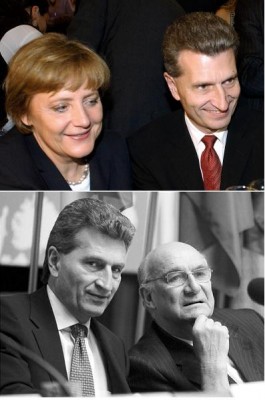
German Chancellor Angie Merkel chose on Saturday to nominate as new EU Commissioner for 2009-2014 Strasbourg's neighbour, the Prime Minister of nearby Regional State (Länder) of Baden-Wurttemberg, Gunther Oettinger from Stuttgart, who is also a specialist on Media policy, with an interest for On-line NewsMedia as "EuroFora".
The move came shortly after Merkel confirmed that her new Foreign Minister will also come from Strasbourg-linked city, via Rhine river, Koeln, thanks to Liberal Party FPD's leader, her partner in the new-coalition, Guido Westerwelle.
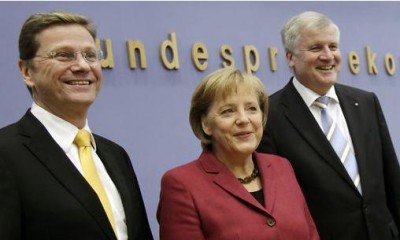
Westerwelle has started his career at FDP's leadership initially as Secretary General when Germany's foreign minister was Klaus Kinkel, who often made Press Conferences at Strasbourg's European Press Center in : As, fex. in 1997, when he had already stressed, in reply to Strasbourg Journalists' question including "EuroFora"'s founder, that "Europe needs an Industrial response" to Boeing-Lokheed a.o. US High-Tech conglomerates, also in order to develop its Defence and Security policy in the World.
Merkel reportedly "surprised" Oettinger by proposing him the Top EU job just before the conclusion of the new Coalistion talks, and she was "happy" that he accepted, expressing her belief that "he will become a heavy-weight" in the New EU Commission.
Speaking afterwards, Oettinger stresed that he sees himself not only as a a defender of Germany's interests "in Brussels and Strasbourg", but also "as serving the European Idea".
If he's confirmed by EU Parliament, he would like to serve in the new EU Commission at "a task related to Economy", he said.
Oettinger has often visited Strasbourg and its surroundings, particularly on common Franco-German projects, such as the creation of a tri-national Metropolitan Region at "Ober-rhein" area, the development of Renewable Energy sources, etc.
Pointing at the importance of Research, Education and Innovation, Oettinger had recently stressed that if Europe "networked its Institutes and Labos", it could "become as strong as" the USA. (F.ex. the Ober-rhein Metropolitan region, "from Karlsruhe to Bale", could "become as strong as Boston").
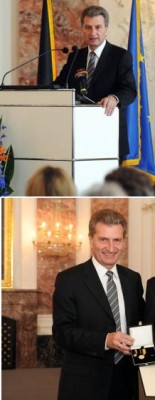
Resuming in 2009 more than 8 Years of experience as head of CDU's policy on Media (1999-2007), Oettinger stressed, on issues of interest for "EuroFora" and other projects that, today, "Internet Media" are in the process of "winning an increasing influence on the (public) opinion".
But he warned also against the risk for some "Search Engines" to "threaten Pluralism" "in the area of Electronic Media" : "F.ex.", "they don't reflect an objective search result, if it depends on factors which don't guarantee the visibility of certain contents, or allows exclusions".
"However", visibility and "detectableness ...is ..an essential prerequisite for Pluralism in a Digitalized World", he observed.
Oettinger also pleaded for "more transparent" and "foreseeable" decisions of Public bodies taking decisions which affect Medias' freedoms, in order to help "emege a higher level of investment security".
MEPs, Sarkozy and Berlusconi ask EU Borders action on illegal migration : Turkey worse than Libya ?
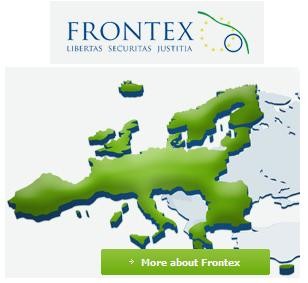
The need for imminent EU Council's decisions to protect Europe from massive illegal immigration traffickers mainly accross EU's Southern Maritime Borders, guarded by FRONTEX, and in particular to convince 3rd Countries as Turkey to respect their obligations, was strongly stressed, after EU Parliament's debates this week in Strasbourg, also by French President Sarkozy and Italian Prime Minister Berlusconi, in a joint move on Friday.
Astonishingly, facts debated by MEPs, EU Council and Commission, and cited by the Italian and French leaders, reveal that the EU-candidate and EU- funded Turkey behaves worse than ..Libya !
Europe, contrary to the US, being surrounded by other 2 nearby larger Contintents, Africa and Asia, often with easy to cross Maritime External Borders, particularly from the South/East, the main focus is on the Mediterranean :
Thus, the heads of the 2 bigger Mediterranean countries, French President Sarkozy and Italian Prime Minister Berlusconi, in a joint Letter to EU Council's chair Swedish Prime Minister Reinfeldt, and EU Commission's President Barroso, stressed the need for "the next EU Council... to decide immediately" on the matter.

- "A considerable challenge for EU and all its member states, on Humanitarian, Political and Social grounds, is Illegal Immigration", which "exerts an unprecedented pressure on EU's Exiernal Borders, in particularly in the Mediterranean", they stress from the outset
- That's why, "Mediterranean is an important Test for the credibility of the European activities", as well as "for the application of the EU pact on immigration and asylum" already decided in 2008.
- "Solidarity among EU Member States should not remain only words, but should go towards a real burden-sharing", they note.
The "clear political message to revitalise Europe's commitment against illegal migration in the Mediterranean", launched by "EU Council of June" 2009, "must now have a concrete and ambitious follow up", they observe.
Paradoxicaly, while one of the "clear and detailed Political Orientations" which "must be decided without delay", is the obligation of "3rd countries of origin to cooperate" in order to "struggle against illegal immigration at the Sea", nevertheless, a non-candidate, and non EU - funded 3rd Country as Libya had its illegal migration flow "recently reduced", while, on the contrary, EU candidate and EU-funded Turkey "has still to make similar efforts" !
Thus, Libya only needs to "consolidate" its recent moves by concluding an agreement with the EU, (with the help also of International organizations providing protection whenever due)? But, on the contrary, "Turkey is 1st to have to assume its Responsibilities, mainly on Borders control and on Readmission", the French and Italian leaders stress.
What is needed is "a real mobilization of Countries of origin, transit and destination, ..across the main migration roads, focusing on prevention and struggling against illegal migration networks" or trafficking of human beings.
The other key points are : - "Maritime operations in the Mediterranean" with "a clear commitment" to "intercept and return back", while"respecting International obligations". "Specialized Offices for Frontex" "created wherever needed", for "monitoring and checks" to act "on the spot". "Common operations of Airflights for return at an EU level". The creation of an "Erasmus" program for "Border Guards", "in order to help emerge .. a real professional community Europe-wide".
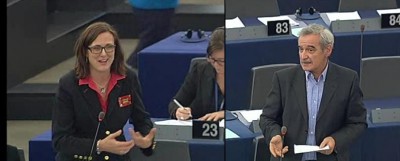
The French and Italian concerns are largely shared also in Greece and Cyprus, while EU Council and Commission are already "aware", showed EU Parliament's debates, earlier this week in Strasbourg :
Even .. "harassment by Turkey of Aircraft operated by the EU Agency for External Border Security (FRONTEX), was denounced by MEP Nicolaos Houdis, in a written question to the Swedish EU Presidency, debated during EU Parliament's plenary in Strasbourg.
- "Since May 2009, 6 incidents have been recorded in which aircraft operated by the EU agency for External Border security (Frontex) have been subjected to harassment, either by Turkish Aircraft or through Radio communications", observed the MEP.
F.ex. "on .. September ..a Frontex Helicopter flown by ..Latvian pilots ..en route from the island of Kos to Samos, ..received radio interference from a Turkish radar ..demanding that it withdraw from the area !", he noted, asking the EU "what measures it will it take vis a vis Turkey ?".
-----------------------------------
- "EU Councll is aware of these incidents", replied EU Chaiwoman in office, Swedish EU Minister Cecilia Malmstrom, and "says to Turkey that as a candidate country, they have to share Europe's values".
- "Frontex's turbo Airplanes" are part of its "common operations" which "are important contributions to the protection of EU's External air Borders", she observed.
- "Borders depend from International Legal Treaties", and "EU has urged Turkey to strive for better neighborhood relations".
Fex. "Poseidon 2009 operations" by Frontex, taking place in Greece", "focus on preventing illegal crossing of borders by individuals who come from, or transit through Turkey and North-African countries, trying to reach the Greek coasts". This "includes, of course, also the use or technical means in EU's Airspace along the Greek islands' Border", and "Turkey was informed", EU Chairwoman noted.
- Thus, "EU urged Turkey to avoid all kinds of Threats, provocation of Conflicts, or measures which can damage the positive climate and the possibilities that conflicts find a peaceful solution", while "we (EU) systematically remind Turkey that it must have Good Neighborhoud Relations", fex. on May and July 2009, Malmstrom stressed.
Currently, Turkey is negotiating about "methods for working" eventually with Frontex, she added, but without elucidating what kind of "methods" Ankara asks..
-----------------------
Moreover, "EU Commission is aware" of "a particularly grave problem" of "illegal immigration in Cyprus" where "a large number of 3rd countries' citizens illegaly cross the "Green Line"" from the territories occupied by Ankara's Army, a reply given to a written MEP question stressed this week.
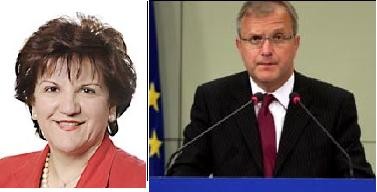
But controversial EU Commisioner on Enlargement, Oli Rehn, was criticized by Cyprus' MEP Antigoni Pericleus-Papadopulu, for "not even intending to exert pressure on Turkey" (fex. by "threatening an eventual suspension, even partial, of accession negotiations, if Ankara still fails to comply with its obligations", as she said), but, on the contrary, limiting himself only into .. "studying" ways to "help Turkey's efforts" (sic) "by augmenting EU Funds to Turkey, via pre-Accession Aid" even more !
Rehn appeared satisfied merely by the fact that "EU Commission's envoys visited Turkey on September 2009" in order to "incite the Turkish authorities to make greater efforts to face illegal migration", resulting only in Ankara's acceptance to "re-start again negotiations on re-admission", and to promisse to "accelerate negotiations for an agreement on cooperation with Frontex"...
***
- EU Cohesion+Agriculture at risk by Financial perspectives draft: Lamassoure reminds Barroso promisse
- Nobel Peace Prize Committee President Jagland to EuroFora on Obama message : focus on Future ?
- Merkel's choice for EU Future, Dr Schuster to EuroFora: Multi-level EU Identity + June 2010 deadline
- European Court of Human Rights warns Oli Rehn not to miss key "details" in his 2009 Turkey report
Main Menu
Home Press Deontology/Ethics 2009 Innovation Year EU endorses EuroFora's idea Multi-Lingual FORUM Subscribers/Donors FAQs Advanced search EuroFora supports Seabird newsitems In Brief European Headquarters' MAPs CoE Journalists Protection PlatformBRIEF NEWS
- 00:00 - 02.06.2021
- 00:00 - 18.10.2020
- 00:00 - 19.06.2020
- 00:00 - 18.05.2020
- 00:00 - 20.04.2020
- 00:00 - 02.02.2020
- 00:00 - 09.12.2019
- 00:00 - 27.11.2019
- 00:00 - 16.11.2019
Popular
- Yes, we could have prevented Ferguson riots says World Democracy Forum's Young American NGO to ERFRA
- Spanish People Elect CenterRIGHT Majority with 1st Party and Total of 178 MPs (6 More than the Left)
- Pflimlin's vision
- The European Athletic "Dream Team", after Barcelona 2010 Sport Championship Results
- Source Conseil d'Europe à ERFRA: Debatre Liberté d'Opposants à Loi livrant Mariage+Enfants à Homos ?
- Head of BioEthics InterGroup, MEP Peter Liese : "Embryonic stem cell research reaching its END" !?
- Spain: Jailed Turkish Terror suspect with Explosive,Drones,Chechen accomplices stirs Merah+ Burgas ?
- UN Head Ban Ki Moon at CoE World Democracy Forum : - "Listen to the People !"
Latest News
- Test Photos (f.ex.+ Invit to EU + Korea Peace meeting)
- EUOmbudsmen Conference 2022: Digital Gaps affect People's Trust threaten EF Project on EU Future ?
- French Election : Black Out on Virus, but Obligation for Fake 'Vaccines" Challenged
- Both French Presidential Candidates point at "Humanism" in crucial times...
- France : Zemmour = Outsider may become Game Changer in Presidential + Parliamentary Elections 2022
Statistics
Visitors: 62257125Archive
Login Form
Other Menu
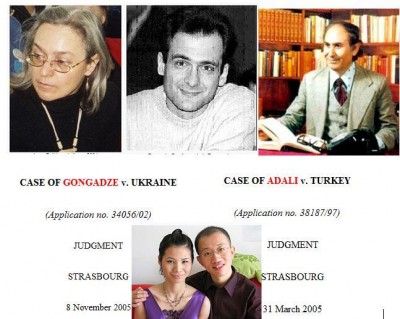
Hu Jia's prize brings SAKHAROV's wife to "EuroFora" on murders of Journalists Politkofskaya, Gongadze and Adali :
- Elena Bonner : "All Journalists' murders must be fully investigated", without Double Standards.
During a special Mega-Event to celebrate 20 Years of SAKHAROV Prize for "Freedom of Thought", attributed in 2008 by EU Parliament to jailed Chinese Cyber-Dissident Hu JIA, the move was reinforced by strongly criticizing the persisting impunity in three cases of Journalists' Murders, such as POLITKOVSKAYA in Russia, GONGADZE in Ukraine, and ADALI in Turkish-occupied part of Cyprus.
Any bureaucratic doubt about whether Cyber-dissidents like Hu JIA might have, or not, a right to be protected as all Journalists must be, particularly when they take risks to search, find and publish original and critical News on issues of general interest to the society, could not resist to the emotion provoked by the message of his Wife, Zeng JINYAN spectacularly transmitted at a big screen in EU Parliament's hemicycle :
- "The most important and most interesting thing he did was to ... say the Truth :.. to write about the phenomena he observed... He never stopped Publishing.. on websites, so that the Public could learn about the reality .. and understand it. In my view, this has been his greatest contribution", stressed the young wife of the jailed man, eager to cite also the cases of other critical journalists who faced various kinds of "harassment".
- "Welcoming all those who have suffered for defending Human Rights", EU Parliament's President, German MEP Hans Gert POETTERING, who had invited to Strasbourg all former Sakharov prize-winners from various Countries throughout the World, said that "China needs Europe, and Europe needs China : A great nation" with which "we want to have a good relationship", "association and ..friendship". "But we are never going to stop our fight for Human Rights, and No Government can expect this from us".
- "It's impossible to achieve goals of Peace, if Human Rights are left out. In fact, Peace and Human Rights are intrinsequaly linked", added POETTERING.
It's in this spirit that MEPs adopted, on Thursday, a Resolution denouncing that "the criminal
investigation and trial following the murder of (a) Journalist ...raises serious concerns with regard to transparency and respect for the rule of law", when a "brutal killing has not yet been fully investigated and solved in a satisfactory way".
The text refered to dissident Journalist "Anna POLITOVSKAYA", a critic of Tchechen conflict, killed some years ago in Moscow, where Russian Authorities have found, arrested and are currently judging two executants, while also searching to arrest also a 3rd one, allegedly escaped in Belgium. But they have not yet found the instigators.
Similar texts were adopted recently also on dissident Ukranian Journalist Georgiy GONGADZE's murder, for which Ukranian Authorities have at least found, arrested and condemned 2 executants to 12 and 13 Years of jail, but not yet the instigators. For that purpose, they recently accepted an International Experts team to participate to the investigations.
But, it's only for the Murder of dissident Turkish Cypriot Journalist ADALI, in the occupied territories of Cyprus, that Turkey has NOT yet found ANYONE responsible, and even claimed recently inside CoE that it would be "impossible" to do so !
These astonishing differences exist despite the fact that ECHR condemned alike Ukraine and Turkey with 2 Judgements on the same year : 2005, for the murders of Journalists GONGADZE and ADALI, strong critics of Corruption in Ukraine, and of Ankara's policies on mass-influx of Turkish Settlers in the Occupied Territories of Cyprus, respectively.
Regarless of that, CoE's Committee of Ministers, who is entrusted with the duty to supervise execution of ECHR's judgements, has just asked Ukraine's Government to reply to further questions on Gongadze's murder before March 2009, while Turkey, curiously, got a longer postponement for answering questions on Adali's murder, until June...
A comparison of these cases, raises serious questions about Double Standards :
------------------------
On TRANSPARENCY :
--------------------------
On Gongadze's murder, CoE's body speaks even about the participation of
"an INTERNATIONAL group of Experts" in the Investigation, (f.ex. of "Tape Recordings"), accepted by Ukraine.
On the contrary, on Adali's murder, CoE is obliged to repeatedly ask (for a 2nd
time) Turkey whether, at least, it informed the victims' Family, or not...
------------------------------
- On EFFICIENCY :
-----------------------
On Gongadze's murder, CoE formally "recalls that the Committee (of Ministers) ..URGED the Ukranian authorities.. to TAKE ALL NECESSARY INVESTIGATIVE STEPS TO ACHIEVE CONCRETE and VISIBLE RESULTS in the INVESTIGATION, aimed at the Identification of the INSTIGATORS and Organisers of the Murder", and "STRONGLY INVITED the Ukranian Authorities to provide information on the PROGRESS IN THE INVESTIGATION", before MARCH 2009.
But, on Adali's murder, on the contrary, CoE's body merely .. "took note" of the "arguments presented by" Cyprus, which denounce the absence of any proof of new "investigation" by Turkey. Following Turkey's own suggestion (!), it simply "noted" that there is "no limitation period" for "any new element" to "lead potentialy (sic !) to a Re-Opening of the Investigation". Without saying who might find any such "new" fact, since Turkey stoped searching... It also POSTPONED the issue until .. JUNE !
-----------------------
- On the PUNISHMENT OF THOSE RESPONSIBLE :
----------------------
- On Gongadze's murder case, Ukranian Authorities already arrested and condemned, at least 2 suspects, to 12 and 13 Years of jail. And on Politkovskaya's murder at least 2 suspects are judged, and a 3rd one "wanted".
On the contrary, on Adali's murder case, the Turkish authorities simply claim that "it had not been possible to obtain new .. information .. on the basis of which criminal charges could be brought against ANY person" !...
Moreover, a LETTER sent by Turkey ...2 Years after CoE's 2006 call to re-investigate anew Adali's murder case, is totally EMPTY of Facts ! As Cypus' Delegation denounced earlier, Turkey's Letter ONLY CLAIMS that a "New Investigation" was made without any result, but does NOT even cite ANY FACT to prove it :
F.ex.,on the crucial issue of the "MOTIVATIONS" behind Adali's murder, noted by ECHR, Turkey MERELY CLAIMS that "all allegations were investigated; without result", but OMITS ANY FACT TO PROVE IT !..(It doesn't even remind which were these "allegations").. .
+ On ECHR's astonishment that the Turkish Occupation regime didn't produce any "BALLISTIC REPORT" on the Shots which murdered Adali, Turkey again repeats, 12 years later, that, still, even until now, "it was not possible to obtain the BalisticReport"...
- As for the astonishing absence of key-WITNESSES' Testimonies, denounced by ECHR, Turkey agains repeats various pretexts avoiding to reveal anything, (Fex. that a person "left" the Occupied Territories "on 2002", or that another witness was heard, but without revealing nothing of what he said, etc).
Turkey obviously "FAILS TO MEET THE CRITICISM made BY THE COURT" for lack of any efficient Investigation in Adali's case, concluded Cyprus' Government.
---------------------------------------------
Replying to our Question which COMPARED these 3 outstanding cases of "JOURNALISTS MURDERS", Adali, Gongadze and Politkovskaya, in order to avoid "Double Standards" by asking from Ukraine and Russia more than what is asked EU candidate Turkey, many European personalities were critical /
They criticised Ankara's recent claim at the CoE to stop investigating, because it would be "impossible to find anyone" responsible for the 5 bullet shots which killed Kutlu ADALI in front of his Family Home, contrary to the other two Journalists' murders, where Ukraine and Russia at least arrested the executants, searching now for the instigators :
----------------------------------
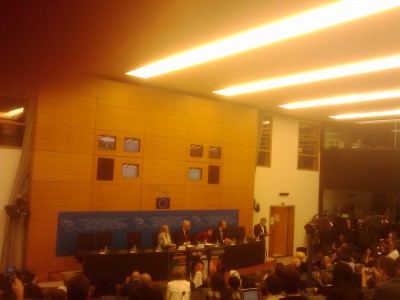
- "Where was that ? In Turkish Occupied Cyprus ? WITHOUT ANY DOUBT : Any murder of Journalist should be investigated in full ! All these Murders must be investigated !", replied the famous SAKHAROV's wife, Elena BONNER to our question on Adali's case, compared to Gongadze and Politofskaya.
Elena Bonner spoke us EXCLUSIVELY shortly after being honored by the President
of EU Parliament on the occasion of 20 Years of her husband's SAKHAROV Prize.
A strong personality, Sakharov's wife even had to struggle against an anonymous EU staffer who, astonishingly, tried to stop her speaking when h heard our question on "Turkey" (!) : - "Please, let me translate, she continues
speaking, don't stop us !", had to cry Sakharov's daughter, (a Journalist
herself), who was translating her mothers' reply, (obliged to speak louder to
make her voice heard despite the harassment).. (= + Audio Proof !)
Earlier, Elena Bonner also fustigated "Double Standards" at another case, on
Western countries' attitude vis a vis Kosovo and the Kurds : -F.ex. "You have
recognized a few 400.000 Kosovars as an "independent" country, but you still
deny that to 30 millions of Kurds in Turkey !", she denounced.
-----------------------------
- "This (ADALI's murder) is an issue which should be pursued by the Committee
for Human Rights. That's why we have one, and it's its duty to examine cases of
Journalists' murders as the one you referred to. You should bring the case in
front of that Committee", suggested in reply to our question on Adali, EU
Parliament's President, German MEP Hans Gert POETTERING.
- "It's impossible to achieve goals of PEACE, if HUMAN RIGHTS are left out :
in fact, Peace and Human Rights are intrinsequaly linked", added POETTERING.
--------------------------------------
+ "For us (European/International Federation of Journalists) it's clear :
Whenever a Journalist is Murdered, the Investigation should continue until
those Responsible are found !", replied earlier to another question on ADALI
EFJ/IFJ's Secretary General, Aidan WHITE.
Speaking as a matter of General Principle, White asked us for "concrete data"
on the execution of ECHR's judgement on Adali case, in order to "look at it in
depth" and "make a formal statement", in comparison with the other Murdered
Journalist case, also pending at CoE's Ministers for completing its execution,
on Ukranian Gongadze.
----------------------------------------------------
From EU Rapporteur on Human Rights, vice-President of EU Parliament Liberties' Committee, MEP Giusto CATANIA, we were told that, since there is an ECHR judgement in both Adali and Gongadge's cases, "Turkey must naturally execute the judgement and make a full and efficient investigation, until those responsible for the Journalist's murder are found and punished".
Even if "we (Catania's "EuroLeft" Group) support Turkey's EU perspectives, this does not mean that Ankara should not behave properly. On the contrary, it means that they have to meet tough conditions, particularly on Human Rights", was added on the occasion of Adali's murder case.
Moreover, "since you raise the issue of Mr. Adali's muder as a part of a Series of Journalist's murders, including fex. Gongadze, Politkovskaya, ao., tthen we (EU) could also act together with CoE's Commissioner on Human Rights, Thomas HAMMARBERG, it was suggested.
- "We (EU) must step up efforts against the problem of IMPUNITY : Real Peace cannot exist without Justice", stressed also this week at EU Parliament in Strasbourg, French Minister on Human Rights, Mrs Rama YADE.
------------------------













